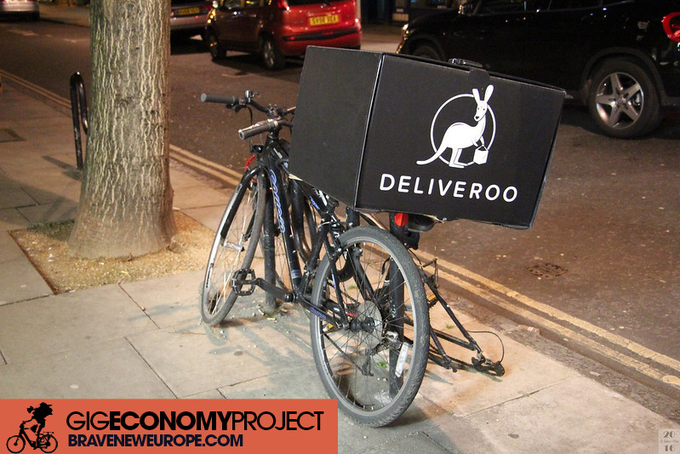Report on latest of 41 court verdicts against false self-employment of riders in Spain, and update on divisions over the Spanish Government’s so-called ‘Riders Law’.
Ben Wray is a freelance journalist leading BRAVE NEW EUROPE’S Gig Economy Project.
This series of articles concerning the Gig Economy in the EU was made possible thanks to the generous support of the Foundation Menschenwürde und Arbeitswelt


748 Deliveroo riders have been falsely considered to be self-employed and must be given employment contracts, a Barcelona court found on Tuesday [12 January], in what is the 41st court victory in Spain against false self-employment of gig economy delivery workers by digital platforms.
The court case, which was instigated by the Spanish Labour Inspectorate after being brought forward by the Intersindical Alternativa de Catalunya, a radical trade union in Catalonia, and the RidersxDerechos network, a delivery workers union in Barcelona, was the largest trial of its kind to so far be held in Spain, and will see all the riders registered with the social security authorities and $1.31 million in social security tax arrears paid. Deliveroo, a UK company operating through Roofoods Spain, say they will appeal the decision.
The verdict echoed the view of the Spanish Supreme Court last year in a similar case involving a Glovo rider as well as other Spanish court verdicts on the matter, finding that “this is an employment relationship”. Glovo had sought to argue that the September Supreme Court ruling in the case of rider Isaac Cuende was isolated, and could not be considered to be a precedent for other delivery workers, but it has been used as such in Spanish courts since September.
“The Supreme Court, in its recent ruling of 25 September of 2020 has also declared the labour nature of the Glovo company’s distributors, who carry out their work in similar terms to those tried here,” the Barcelona judge stated on Tuesday.
RidersXDerechos say this, as well as all the other legal victories since 2017, shows that the question of whether riders should be considered employees and not “contractors” is now legally “settled”. Over those four years, the Labour Inspectorate has forced Glovo, Amazon, Deliveroo and Uber to register 17,957 workers as employees, and the companies collectively owe €26 million in social security tax arrears.
‘Riders’ Law divisions
The Barcelona verdict comes as negotiations over the so-called ‘Riders Law’ – Spanish Government legislation to end false self-employment – are set to re-start next week between ministers, unions and the employers’ association. The legislation has been delayed over divisions within the coalition government and resistance from platform companies to the original plans of the Ministry of Labour, which is led by “left-wing” Podemos MP Yolanda Díaz.
The latest indications are that Díaz has bowed to pressure and is now not seeking to force companies to register and disclose their algorithm to regulators, claiming that this is a matter for the Economy Ministry not her Labour Ministry. Unions have argued that disclosure of the algorithm is essential for understanding the conditions of work. The Gig Economy Project reported last week on an Italian Court verdict which found that the algorithm of Deliveroo discriminated against workers who took strike action or were ill.
There has also been disagreement over the breadth of the ‘Stop Fake Autonomous Law’, with unions arguing it must include not just riders but also carers working for home care platforms, something Economy minister and vice-president Nadia Calviño, of social democratic PSOE, is understood to be resisting.
On Tuesday, RidersXDerechos responded sharply to Pablo Iglesias, Podemos leader and vice-president of the Spanish Government, who had welcomed the Barcelona verdict and congratulated RidersXDerechos, adding that: “The Ministry of Labour prepares a Law that recognises this condition and ends their extreme precariousness.”
“Our position on this new legislation is clear and resounding,” RidersXDerechos stated in reply. “We will NOT support any legislative change that is exclusive to riders, since with 41 court trials won our case is already settled. We demand that this fraudulent model be acted upon in its entirety.”
They continued: “How do we ask to go beyond the riders? By registering the part of the algorithm that affects workers [and] with the obligation that the platforms have to join a registry in which the number of workers, collective agreement, sector, etc is determined.
“This is why we will support legislative measures that tackle the model at its roots. We will not support laws that disguise what 41 court rulings already have decided. Furthermore, all legislation must be accompanied by the strengthening of the Labour Inspectorate and the judiciary.”
The Gig Economy Project spoke to Felipe Corredor Álvarez from RidersXDerechos in September last year about their hopes for the “Stop Fake Self-Employment Law”.
“For me the important thing is not only the law itself, it is to defend the dignity of the workers,” Corredor Álvarez stated. “We will support the Stop Fake Self-Employment Law if it does this, but not it if it doesn’t protect all those exposed to this form of exploitation.
“RidersxDerechos will not accept the model of France or the UK. We are not only fighting for the rights of the delivery workers, we are also committed to fighting for the rights of all gig economy workers. We are fighting against the Uberisation of the whole working class.”


Be the first to comment